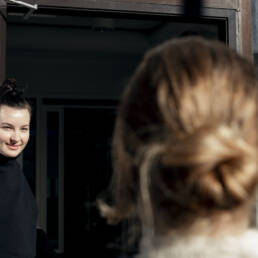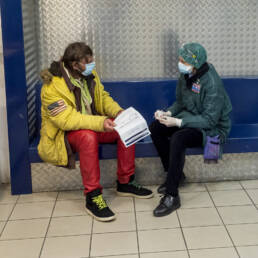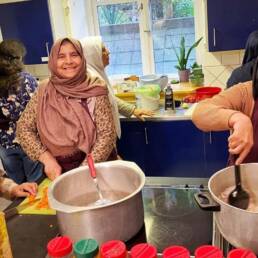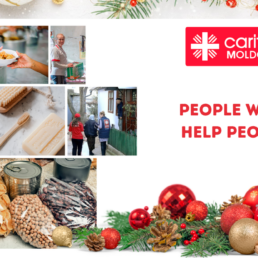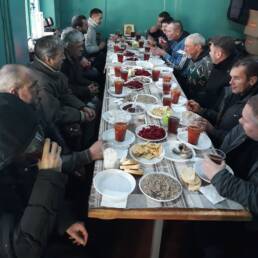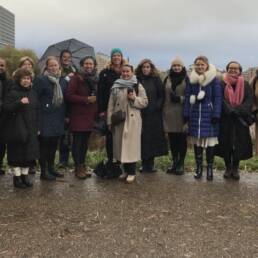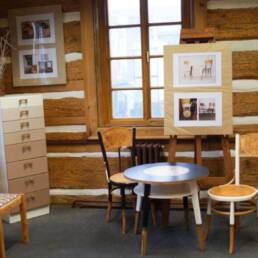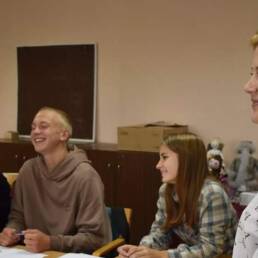Author
Magda Hirschberger
MOBI.Berlin+
Caritas Berlin
There is a constant reproach made against ideas that they are only ideas, imaginations, unfit to become practice. It is also a constant reproach towards the European idea that it is abstract, or even elitist, its different agents more concerned about their own profit than a common perspective, and without any real referent in the daily work of its institutions. To this Caritas Europa is answering with a wide range of projects in various European countries, with the aspiration of fighting poverty and the social marginalisation that goes along with it.
On her first official visit to Berlin, Maria Nyman, the new Secretary General of Caritas Europa, visited one of these projects, MOBI.Berlin+ – The Mobile Counselling Bureau for Newly Arrived Berliners from South Eastern Europe, which started in 2016 to support new coming EU-citizens from south-eastern Europe. Our focus lies on persons and families from Bulgaria and Romania, the two countries that joined the EU in 2007, with full rights to free mobility in Germany granted in 2014. To assist the integration process of these persons and families and to empower them as they proceed in building a new life in Germany is our declared aim. For this, our project is based on three distinguished and at the same time closely intertwined fields: our social counselling and accompaniment/intermediation are low-threshold and our mobile offerings grant the target group access to local social services. In cases of conflict in residential environments or in public spaces, MOBI.Berlin+ tries to find solutions through outreach work. We understand ourselves as bridge builders for those in need of help, our mobile counselling offering access to the local services for education, integration, health and further counselling.
To make this more concrete, let’s name an example. Imagine a family called Ion. Mr. and Mrs. Ion and their three children live in Romania where they are facing an extremely difficult economic situation. One day the family decides that they do not want to live in Romania anymore and Mrs. Ion calls her sister in Berlin, who invites them to stay with her in her small flat for a few weeks. The family moves and Mr. Ion starts looking for a job, but he cannot find one. In addition, Mrs. Ion and her sister start fighting a lot, until the sister asks the family to move out. Now, the family will soon be homeless, without money and without any idea of how to get out of this situation. From friends they have heard about MOBI.Berlin+ and decide to give it a go. The first time we meet them we mainly listen, while the family tells us about their situation we take notes on important details. Together with the family we then work out a plan which includes medical care, access to education and social services, and support in finding a permanent residency.
However, frankly speaking, the life conditions in which we meet the families and persons from south-eastern Europe are often even more precarious and many of them do not find their way to us on their own. Many of them live under extremely difficult conditions, sleeping in parks or in cars, working in precarious employment relationships without any safety net to turn to. It is by outreach work then that we establish our first contact, answer questions and give information about offering easy access (like medical care without health insurance, showers, soup kitchens or clothing stores). In an ideal case, building a relationship and gaining trust gives us the opportunity to involve the persons and families in a long-term counselling process, inviting them to visit our bureau, tell us about their situation and to offer new perspectives for building a permanent life in Berlin. But even then the difficulties the newcomers are sometimes facing do not seem to stop. Whenever we get to the point to think now we can send the newcomers on their way, another letter is being pulled out of the pocket and the counselling process starts over again. And still, what we aim for is empowerment of our clients to become more and more autonomous and to make use of the rights and possibilities they have as EU-citizens coming to Germany.
As a result of our work and experience, in 2018 we started an additional project named TRIA that offers help with the search and the application procedure for a job.
The aspiration of Caritas Germany ‘Not sehen und handeln’ – ‘To see misery and to act accordingly’ – makes acting on a European level for solidarity and unity a daily part of our work. For that matter, MOBI.Berlin+ is a project financed in large part by FEAD, the Fund for European Aid to the most Deprived, which is dedicated to fighting poverty in Europe and to enabling those suffering from it to make use of the right to improve their life situation through migration.



